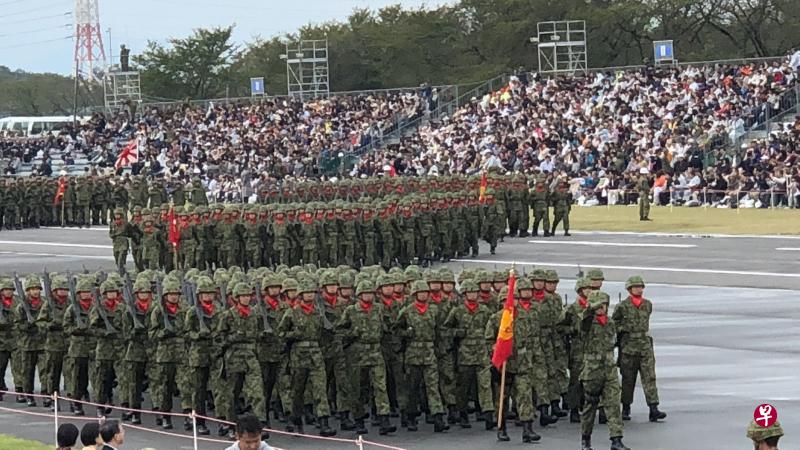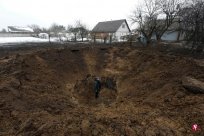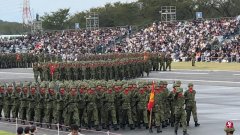
International Special Special
Tokyo Special Commissioner
Japanese Prime Minister Kishida Kishita has been in power for more than a year. The biggest political achievement is to complete the "expansion" blueprint for the Liberal Democratic Party.On the grounds of improving military deterrence and response to the surrounding affairs, including the situation of the Taiwan Strait, he finalized the plan that would double the defense budget within five years, and also gave the Self -Defense Force to have the power of "attacking enemy bases" that had never been attacked after the war.This expansion policy is considered to be completely buried in the route of pursuit of peacetime after the Second World War.How does Japan promote the constitutional amendment step by step?How does public opinion look at this change?
On December 16, 2022, the three security documents of Japan's national security strategy were passed in the cabinet.These three documents are Japan's national security strategy strategies for defense strategies and defense forces. The main contents are clearly determined that Japanese defense expenditures account for the ratio of GDP (GDP), from 1%to 2%.The Kishida government plans to increase defense expenditure to 43 trillion yen (about S $ 427 billion) within five years from 2023, which is doubled compared with the current huge number.
In terms of strengthening deterrence, these documents also understand that the Self -Defense Forces must have the ability to hit the enemy missile base.In addition to improving the domestic missile defense system, it will also purchase advanced military reserve such as Tomahawk cruise missiles in the United States.
Daily News noticed that the expansion plan issued by Kishida has a significant feature, which states that the goal is to achieve within 2027.The "invasion" of the strong army described by the document -Japan must be able to deal with the invasion and strengthen the defense forces with the support of the allies.The newspaper interpreted that the official timetable for five years is to concentrate the firepower to respond to the situation of the Taiwan Strait.
According to the report of the Daily News, Japanese officials or reference to the U.S. military's opinions believed that 2027 was the third period of administration of the Chinese official period in 2027, and the establishment of the army for the establishment of the army in the Chinese People's Liberation Army for 100 years.There are big movements within this period.
The Japanese Defense Electronic Edition News Chaoyun posted earlier this year to praise the Japanese government's change in defense policies and believe that this year is the "first year" that thoroughly strengthens the defense capabilities.This article also emphasizes the preparations for the response to the "emergency situation in Taiwan", and call on the official to curb the increasing threat of mainland China in the surrounding area of the East China Sea, and strengthen the defense of the southern Western region of Japan (that is, the islands near Okinawa).
"Taiwan's emergency situation" refers to Mainland China Martial Arts Taiwan. After the war of Russia, it has become a eye -catching topic of public opinion in Japan.The latest issue of Nikkei Commercial Weekly published the "Taiwan Strait Crisis" album, which is believed that this year is an important year for Japan's security policy to lay off in Taiwan.
This article quotes the predictions of Jian Er, a senior researcher at the Global Research Institute of Jianeng Global, stating that the mainland may unify Taiwan in January 2024.In order to enable Taiwan to accept "unification", the mainland will adopt hunger attack. The war scenes that the association war are: the Chinese PLA will conduct intensive military exercises in many waters around Taiwan to effectively block Taiwan, making it difficult for civilian vessels and aircraft to pass.The report regards Taiwan as the second Ukraine, and Taiwan's leaders may also become "Taiwan's Zernezki".
The conservative statement of Japan has focused on amplifying the Taiwan crisis in the past year. Some arguments have also revealed the speech of Taiwan's claims published by Taiwan ’s late President Lee Teng -hui in Japan, which is“ In view of the geographical location of Japan, Taiwan ’s geographical location, Taiwan’ sIt will threaten the sea channels with the surrounding crisis, so that Japan is completely isolated in economy and military ... Taiwan is the life line of Japan. "The above discussion can be said to be the original of the "Taiwan crisis is the Japanese crisis" that the conservative politicians hanging on the mouth.
The former commander of the Japanese Self -Defense Force, the Taiwan Strait crisis scene imagined by the Japanese Self -Defense Force, is based on a "American -Japan War as a sauddy".He pointed out that the United States used 530,000 soldiers to attack Japan during World War II, and Japan had only 60,000 soldiers at the time.Based on this, the military power of the offensive party is often 10 times that of the defense.There are currently 110,000 soldiers in Taiwan. It is estimated that China will dispatch a million army.
Scholars: The security documents are difficult to block the emergencies but exacerbate the tension of Taiwan Strait
Okada, a former member of the Kyodo News Agency, was interviewed by the United Morning Post that the three security documents issued by Kishida were the "phased results" designed by the United States to use the Taiwan issue to provoke the Taiwan issue.
The nature ofThe nature of the Japanese and American security treaties has changed from the "regional stabilizer" to the "anti -China alliance".To build a "comprehensive deterrent" with the allies, Japan is the top priority of its deterrence.
He believes that actively intervening in the Taiwan issue, confrontation with the mainland will only lead to excessive reactions in military and politics.To put it bluntly, Taiwan and Japan are just the "deterrent cards" of the United States to mainland China.It is expected that both Japan and Taiwan will strengthen military strength in the future. In the process, there will only be unpredictable situations.Three sets of security documents cannot prevent Taiwan from emerging, but will exacerbate the tension of the Taiwan Strait.
Okada criticized: "This three security documents in Kishida are a diplomatic failure. If Japan wants to stand up again and get rid of the" 30 years of lost ", it should not be with the neighbors. Now do it now.It is not a threat to render mainland China and make excuses for strengthening military forces. It is necessary to stop hostility to mainland China and restore the suspension of the Japanese leading summit. "
Japan enhances military strength year by year
The Peace Constitution is well -known
According to the Japanese Peace Constitution that the United States helped in 1947, Japan promised to abandon the launch of war and not use force as a means to resolve international disputes.Article 9 of the Constitution also stipulates that Japan does not associate the army and abandon collective self -defense rights.This provision aims to remind Japan that we must do their best to maintain the concept of peace.
Ironically, the United States was ruled by the Constitution that year. Later, due to changes in the situation, it was the United States that re -armed the Self -Defense Forces.
In 1950, the Korean War broke out. Based on its own needs, the United States made Japan a reinforcement force and instructed Japan to re -develop military forces.In the same year, Japan formed the "Police Reserve Team" (renamed the security team in 1952, and renamed the Land Self -Defense Force in 1954). During the Korean War, Japan not only played the role of the US military's attack base and the supply baseAnd thunder and other homework.
In 1954, the Japanese Self -Defense Force Act was officially owned by the Three Self -Defense Forces of the Land and Airlines.In order to make Japan a "ordinary country" with a army, the Japanese Liberal Democratic Party government has been looking for opportunities to modify the peace constitution.After the Cold War, the United States and Japan signed the security treaty. The Self -Defense Force had a lot of opportunities, but based on constitutional constraints, he could not go out and go out.
As the late time, Prime Minister Yoshida Mao had publicly regretted the Self -Defense Force as "a person who couldn't see".He recorded his speech in 1957 in his autobiographical Yoshida Mao.At that time, he said in his speech to the defense university of the Japanese Self -Defense Force cadres who spoke to the first graduate: "The Self -Defense Force can only be welcomed by the public when the state encounters a crisis of survival or was sent to disaster relief.The appearance may be the time when the country is chaotic. In other words, you can't see it, and it means that both Japan and the citizens are still happy.You can endure it now, but don't forget that the future of the Self -Defense Force is on your shoulders."
The end of the Cold War of the East and the West, so that the Self -Defense Force that can only move under the American shadow has a turn.In 1991, the Persian Gulf War broke out. The Japanese Self -Defense Force had the first chance to go abroad and was sent to the Persian Gulf to perform a minesweeper.The following year, Japan passed the United Nations Act of Maintaining peaceful activities, and has since increased the chance of going out as peacekeeping.
After the September 1st incident in the United States, and after the Iraq war, Japan's march distance went further, went to the Indian Ocean to participate in anti -terrorism, and went to Iraq to rebuild.In 2006, after the first time Abe served as Prime Minister, the House of Representatives passed the bill and officially upgraded the defense department to "Ministry of Defense" (Ministry of National Defense).This is the first time in Japan, since World War II, the highest -level national defense agency has set up the cabinet.
When Abe was in power for the second time, in response to the severe surrounding situation, it was introduced in 2014 to ensure the security system that allows the Self -Defense Forces to closely cooperate with the US military.
The security three documents issued by the Kishida government, which explicitly showed the establishment of a joint headquarters of the sea, land, and air, which is considered to be further reorganization of the Self -Defense Force as an agency that responds to the Taiwan Strait crisis.The official also regards the construction of a new era defense network as a major military service, preparing to expand new fields such as network forces and develop foreign space military technology.
There are articles in Kyodo News that the three security documents issued by the Kishida government are consistent with the national security strategy report and national defense strategy report issued by the Bayeng government.EssenceOfficial data has highlighted the surge in Japan -US joint military exercises in recent years, as many as 40 times in 2021.In addition, the number of exercises led by the US military in Japan to participate in the Self -Defense Force is more than before, and the place of exercise has also expanded from Japan to sensitive areas such as the South China Sea.
The Japanese people noticed the threat but opposed the martial arts
The polls released by the Asahi press showed that Kishida's support continued to fall after the security of the security three -year document was introduced last month.According to the polls of the Toyo Economic quotation of the Institute of News, the results show that although 56%of the people agree that the Self -Defense Force has the ability to combat enemies, 66%of people oppose Kishida to make up for the lack of fiscal lack after the expansion of the army.As many as 79%of Japanese people have an uneasy impact on the Taiwan Strait crisis on Japan, but only 7.8%of the Self -Defense Force and the United States fight against mainland China.Some comments and analysis shows that the Japanese people have no emotional things. Even if they are afraid of threats, they insist on opposing martial arts.
During the Persian Gulf War in 1991, there was a lot of opposition voices in Japan at that time for whether the Self -Defense Force participated in the United States.
Honorary professor of the University of Tokyo, Kita Kita Kita, recently issued a post in the Central Public Public, arguing that the practice of bleeding in Japan is to abandon Japan's "foolish strategy" internationally internationally.
Kita Oka was once the Japanese chairman of the Japanese official "Common Research on the History of Japan and China", and later became a think tank for the Abe government to formulate the new security law.He believes that letting the Self -Defense Forces go out and play a role of "maintaining international order" and can establish a Japanese diplomatic image.The new statement he put forward was "no peace that did not stain his hands."
Kitagao said in the text: "I saw the then Prime Minister Haibai Junshu said on the TV (Self -Defense Force) dangerous place, and felt that it was a wrong judgment. As a result, Japan just gave money, first of all, first, first, first, first, first, first, first, first, first, first, first, first, first, first, first, it was for money.1 billion US dollars, followed by $ 3 billion, and finally $ 9 billion. The contribution of $ 13 billion was not grateful in the end, but in exchange for a joke of 'too late to little'.I just want to be a bystander, how can it be called international contribution? "
Tokyo News recently mentioned this past, but it was not criticized, but lamented that the Liberal Democratic Party is now a clear eagle.This article emphasized that although the Liberal Democratic Party supported the eagle sound of the sentient party at that time, the party still maintained a prudent voice to send troops.For example, as the then secretary -general of the cabinet, Fujita Masaham, who was the secretary -general of the sea, vigorously discouraged him, emphasizing that it should not be able to dispatch troops.
The Ministry also wrote down the past in its memoir: "At that time, some people in the party said that it had been a long time to endure the troops in Japan, so this is a chance to be rare.But in fact, those who are cautious still exist, and the representative figure is Hou Fujita. He ran to my office many times to persuade me that you can not open a precedent. Once the Self -Defense Force dispatches, it will be difficult to brake. " According to this article, Hou Fujita has always opposed Japan to send troops. Before persuading the sea, it also prevented the cabinet minesweeper.Some remarks commented that his thinking came from the Japanese army that he had witnessed during World War II.However, Houjita's opposition has not continued to occur within the Liberal Democratic Party.
Japanese public opinion: The process of sending troops to evolve is like an ant digging a hole into a big hole
After the Persian Gulf war was suspended, the Haiju Cabinet sent the Self -Defense Force to minesweeper.The following year, his successor Miyazawa's cabinet formulated the United Nations Act of Maintaining peaceful activities, and later introduced the "Anti -terrorism Law".By 2015, the then Prime Minister Abe issued the new security law and lifted the ban on the collective self -defense.Kishida Wenxiong, who was born in the Liberal Democratic Party, was even more powerful and issued three security documents to allow the Self -Defense Force to attack combat power.
There is such a statement in Japanese public opinion. The evolution of the Japanese troops in Japan is like an ant digging. Originally, it was just a small hole. When I dug a little bit, it became a big hole.



